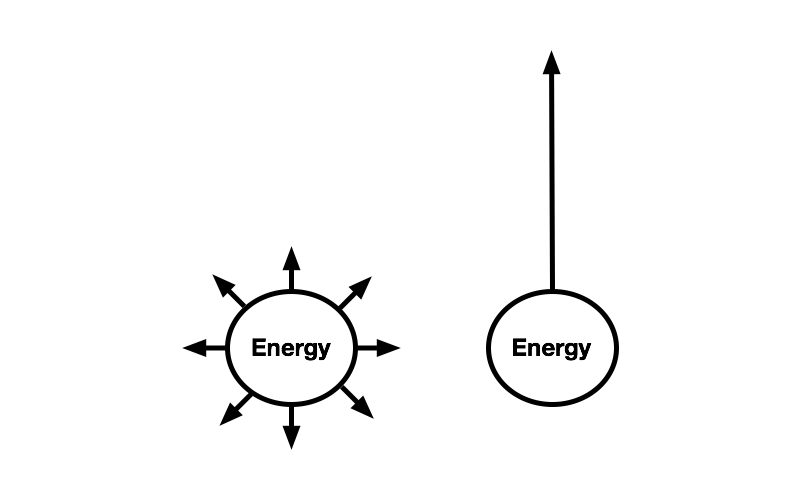In my previous article, we observed that our time is divided among various activities.
As a result, our focus is muddled and attention is scattered carrying out multiple tasks at the same time. Essentialism is about making the right choices. It is about distinguishing the absolute essential from everything else and focusing on it wholeheartedly. Once we make a choice, our focus should be on how to do it right.
1. Do it right
Now, you may ask, what do I mean by doing it right?
Let me explain. When we produce quality work at an elite level with laser focus, we are doing it right.
Your undivided, uninterrupted attention on a specific task triggers certain neurons in the brains. These neurons form a certain circuit in the brain. This clears the pathway for a higher level of performance.
According to Adam Grant, a business professor at the Wharton School of Business at Penn, productivity is a scientific problem we can solve systematically. In fact, he developed a formula called the Law of Productivity:
High-Quality Work Produced = (Time Spent) * (Intensity of Focus)
According to him when we perform an essential task with intense and uninterrupted attention, we produce quality work. But that’s only the tip of the iceberg; there is also a connection between focused attention and happiness.

2. Connect Focused Attention to Happiness
Shallow activities such as spending time on social media, frequently checking and responding to emails, participating in discussions about day-to-day mundane topics do not give us depth or happiness in life. If you need to improve the quality of your life, embrace depth over shallowness.
Skilful management of attention is the key to improving every aspect of our life. The things we choose to focus on and the things we choose to ignore define the quality of life.
People give a lot of importance to circumstances for being happy, I challenge this notion. Neurologically speaking, our brain constructs experiences, happy or unhappy, based on the meaning we give that experience, also known as the meaning-making process.
In our daily lives, when we pay rapt attention to more important things, we do not have time to brood over petty, irrelevant things that are happening in our lives.
By giving anything our focused attention, our passion, our family, our relationships, these essential choices lead to much joy and happiness.
3. Get in the Flow
Most of us think that when we work less and spend more time in a hammock, we feel happy. However, this conventional understanding of happiness is wrong. According to a study, the best moments of life are experienced when we engage our mind to its limits in accomplishing something worthwhile and difficult. This is known as the mental state of flow.
The concept of flow proves that the connection between relaxation and experiencing happiness is overrated. In fact, focused goals are easier to enjoy, as they stimulate our minds and push us to the limits to accomplish the task at hand skillfully. We become so involved with the task at hand that we experience the mental state of flow.
To experience the mental state of flow, the type of activity we choose to give our full attention is paramount.
As I mentioned earlier, when we focus on something worthwhile, something we consider important, we can easily get in the flow. When we apply the same undivided focus to our jobs or business, there’s no doubt we can rise to the top of the mountain.
4. Make Meaningful Essential Choices
“It is our ability to choose that makes us human”
Madeleine L’Engle
As I mentioned earlier, essentialism is about making the right choices or rather reclaiming your power to make choices. Now, the question is what is the right choice?
Let me tell you, anything and everything that creates some meaning in your life is the right choice. For example, I am an endurance athlete. Running is one of the activities that give meaning to my life.
Clearly, ultra-marathon races require me to run for a very long time. This requires tremendous endurance at the physical and mental level. It is believed that an ultra runner runs half his race with his feet and the other half he completes with sheer mental fortitude.
Sometimes, it requires an immense force of will to keep placing one foot in front of the other. There are times when I feel I am about to collapse. However, because this is a meaningful choice I have made, I get the strength to keep going.

Let me give you another example. Consider a craftsman who makes the wooden artefact. Making wooden pieces of art may not generate much revenue, but consider the process of crafting.
The process begins with selecting a piece of wood. The craftsman carefully examines the quality, age and grains of a piece of wood. He may visualize what type of artefact he can create from this particular piece of wood. Then he begins the process of carving and giving it a shape.
After that he gives it smooth finishes and maybe he polishes the artefact. The entire process is so absorbing and almost sacred for him.
In modern-day, a coder can derive the same sense of meaning and sacredness when he writes concise and clear code for a computer program. Each piece of code reflects the individuality and style of the programmer.
Whether you are a programmer, consultant, writer or a lawyer, your work can be your craft. If you hone your ability and skills and apply them to your daily work you can generate meaning in your professional life.
So, while making choices let us ask ourselves, what is meaningful for us?
What can give me joy and satisfaction?
Some sort of order and sacredness is essential to create meaning.
If we can find such meaning in our day-to-day mundane tasks, our life becomes even more worthwhile.


